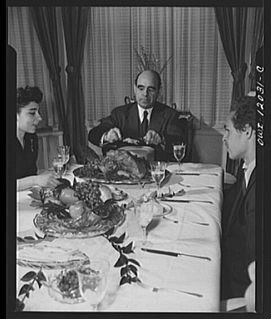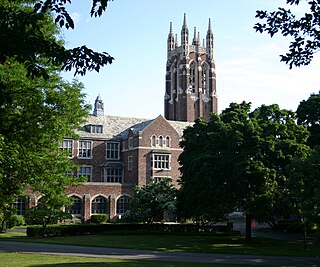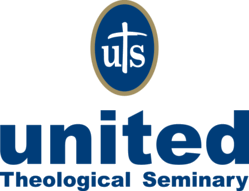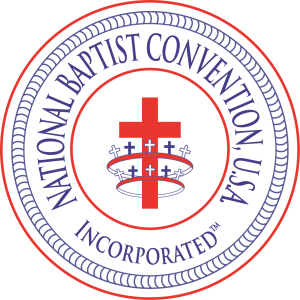
Medgar Wiley Evers was an American civil rights activist in Mississippi, the state's field secretary for the NAACP, and a World War II veteran who had served in the United States Army. He worked to overturn segregation at the University of Mississippi, end the segregation of public facilities, and expand opportunities for African Americans, which included the enforcement of voting rights.

The Progressive National Baptist Convention (PNBC), incorporated as the Progressive National Baptist Convention, Inc., is a mainline predominantly African American Baptist denomination emphasizing civil rights and social justice. The headquarters of the Progressive National Baptist Convention are in Washington, D.C. Since its organization, the denomination has member churches outside the United States, particularly in the Caribbean and Europe. It is a member of the National Council of Churches and the Baptist World Alliance.

Mordecai Wyatt Johnson was an American educator and pastor. He served as the first African-American president of Howard University, from 1926 until 1960. Johnson has been considered one of the three leading African-American preachers of the early 20th-century, along with Vernon Johns and Howard Thurman.

Martin Luther King Sr. was an African American Baptist pastor, missionary, and an early figure in the Civil Rights Movement. He was the father and namesake of civil rights leader Martin Luther King Jr.

Alberta Christine Williams King was Martin Luther King Jr.'s mother, married to Martin Luther King Sr. She played a significant role in the affairs of the Ebenezer Baptist Church. She was shot and killed in the church by Marcus Wayne Chenault, a 23-year-old Black Hebrew Israelite six years after the assassination of Martin Luther King Jr.
Wyatt Tee Walker was an African-American pastor, national civil rights leader, theologian, and cultural historian. He was a chief of staff for Martin Luther King Jr., and in 1958 became an early board member of the Southern Christian Leadership Conference (SCLC). He helped found a Congress for Racial Equality (CORE) chapter in 1958. As executive director of the SCLC from 1960 to 1964, Walker helped to bring the group to national prominence. Walker sat at the feet of his mentor The great Rev. Dr. BG Crawley, who was a Prominent Baptist Minister in Brooklyn, NY and was New York State Judge.

Dexter Avenue Baptist Church is a Baptist church in Montgomery, Alabama, United States, affiliated with the Progressive National Baptist Convention. The church was designated as a National Historic Landmark in 1974 because of its importance in the civil rights movement and American history. In 1978 the official name was changed to the Dexter Avenue King Memorial Baptist Church, in memory of Dr. Martin Luther King Jr., who was pastor there and helped organize the Montgomery bus boycott in 1955 during the civil rights era. The church is located steps away from the Alabama State Capitol.

The Crozer Theological Seminary was a multi-denominational seminary located in Upland, Pennsylvania. The school succeeded a Normal School established at the site in 1858 by the wealthy textile manufacturer John Price Crozer. The Old Main building was used as a hospital during the American Civil War. The seminary served as an American Baptist Church school, training seminarians for entry into the Baptist ministry from 1869 to 1970.

Colgate Rochester Crozer Divinity School is a seminary in Rochester, New York affiliated with the American Baptist Churches USA. The school is progressive and ecumenical in theology, with Baptists, United Methodists, Presbyterians, Episcopalians and members of other denominations on its faculty and in its student body. The school also shares a partnership with Bexley Hall Seabury-Western Theological Seminary, an Episcopal seminary. It is accredited by the Commission on Accrediting of the Association of Theological Schools.

United Theological Seminary is a United Methodist seminary in Trotwood, Ohio. Founded in 1871 by Milton Wright, it was originally sponsored by the Church of the United Brethren in Christ. In 1946, members of the Church of the United Brethren in Christ merged with the Evangelical Church to form the Evangelical United Brethren Church, with which the seminary then became affiliated. When that denomination merged with The Methodist Church in 1968, United Theological Seminary became one of the thirteen seminaries affiliated with the new United Methodist Church.
Otis Moss III is the pastor of Chicago's Trinity United Church of Christ. He espouses black theology and speaks about reaching inner-city black youth.

Gillfield Baptist Church is the second-oldest black Baptist congregation in Petersburg, Virginia and one of the oldest in the nation. It has the oldest handwritten record book of any black church. It was organized in 1797 as a separate, integrated congregation. In 1818 it built its first church at its current lot on Perry Street.

Samuel DeWitt Proctor was an African-American minister, educator, and humanitarian. He was active in the Civil Rights Movement and is perhaps best known as a mentor and friend of Martin Luther King Jr.

The National Baptist Convention, USA, Inc., more commonly known as the National Baptist Convention, is a primarily African American Baptist Christian denomination in the United States. It is headquartered at the Baptist World Center in Nashville, Tennessee and affiliated with the Baptist World Alliance.

Second Baptist Church is a historically African-American Baptist church located in South Los Angeles, California. The current Lombardy Romanesque Revival building was built in 1926 and has been listed as a Los Angeles Historic-Cultural Monument (1978) and on the National Register of Historic Places (2009). The church has been an important force in the Civil Rights Movement, hosting national conventions of the National Association for the Advancement of Colored Persons ("NAACP") in 1928, 1942, and 1949, and also serving as the site of important speeches by Martin Luther King Jr., Malcolm X, and others. It is affiliated with the American Baptist Churches USA and the Progressive National Baptist Convention.

Ebenezer Baptist Church is a Baptist church located in Atlanta, United States, affiliated with the Progressive National Baptist Convention and American Baptist Churches USA. It was the church where Dr. Martin Luther King, Jr. was co-pastor from 1960 until his assassination in 1968, the location of the funerals of both Dr. King and congressman John Lewis, and the church for which United States Senator Raphael Warnock has been pastor since 2005. It is located in the historic area now designated as the Martin Luther King Jr. National Historical Park.
J. Lee Hill Jr., is the senior pastor of Christian Fellowship Congregational Church (UCC) and director of the Interfaith Justice Coalition in San Diego, California. He has served in ministry since 1999, most notably at The Riverside Church in the City of New York. Hill is a licensed and ordained minister with full standing in the Alliance of Baptists and the United Church of Christ.

Samuel Woodrow Williams was an African American Baptist minister, professor of philosophy and religion, and Civil Rights activist. Williams was born on February 12, 1912 in Sparkman then grew up in Chicot County, Arkansas. Samuel Woodrow Williams attended Morehouse College where he received his bachelors in philosophy and later attended Howard University earning his masters of divinity.

Calvary Baptist Church is a Baptist Church founded in 1879 in Chester, Delaware County, Pennsylvania, United States. Martin Luther King Jr. attended Calvary Baptist church while he studied at the Crozer Theological Seminary from 1948 to 1951.
Josephus Pius Barbour was an American Baptist pastor of Calvary Baptist Church in Chester, Pennsylvania who served as an executive director of the National Baptist Association, editor of the National Baptist Voice publication and a mentor to a teenaged Martin Luther King Jr. during his time as a student at Crozer Theological Seminary.

















